In the early days of ecommerce, online stores used photography that was mostly functional. Think uncluttered images and a lot of detailed product shoots. While these types of photos are still important, it wasn’t long before sellers realized that online stores were missing a key component of their brick-and-mortar counterparts: context.
Enter lifestyle photography. Taking a page from fashion magazines, ecommerce founders realized the power in telling a story with photography. Styled shots of models in an environment showed up alongside product photos, and eventually digital lookbooks became commonplace for online apparel brands.
Lookbooks are a tool for brands to take a strong viewpoint on style, show relevance within current trends, and ultimately compel customers to buy afeeling.
Online lookbooks inspire customers to see how a product fits within their own lifestyles. They can envision how they might style a pair of wide-leg jeans, or where they might place a floor lamp in a room. They are a tool for brands to take a strong viewpoint on style, show relevance within current trends, and ultimately compel customers to buy afeeling.
Here, we’ll look at the evolution of lookbooks from lifestyle photography galleries to moving, interactive, and shoppable selling tools. Plus, we’ll walk you through the easy steps to create a digital lookbook for your brand, using real inspiring lookbook examples to guide you.
What is a digital lookbook?
A digital lookbook is an arrangement of photos and multimedia displayed in an online format like a PDF magazine or webpage. They are used as portfolios for artists and designers or as a branding and selling tool for consumer brands that sell lifestyle or fashion products. Digital lookbooks typically feature lifestyle photos—and sometimes videos or GIFs—in multiple layouts and digital formats.

使用工具如lookbook-enabled网站模板s and lookbook apps or plug-ins, brands can create dynamic lookbooks that have features such as animations, carousels, video, and shoppable images that link directly to product pages or the shopping cart.
Why create a digital lookbook for your brand?
Lookbooks offer a way for founders tocreate a customer experience and immerse customers in their story, in the way retailers use merchandising to achieve the same. In lieu of being able to try on or feel products IRL, lookbooks inspire the imagination and show products in action. This can help convert customers who can more clearly see styling options, movement, and drape of a garment.

Digital lookbooks are also aneconomic and sustainable way for brands to produce an editorial-style assetat a low cost. At an in-person event, a simple four-by-six-inch card with a QR code can link to a multi-page full-color spread of lifestyle photography—with more functionality and less waste than a print lookbook.
The purpose of a lookbook can vary depending on the type of business. Some wholesale-only or B2B brands may use a digital lookbook as a wholesale catalog for prospective retailers. Most B2C and DTC businesses use lookbooks to make a statement about brand aesthetics and values.
Not every brand is a good candidate for a lookbook. The fashion industry has the biggest opportunity, followed by home décor, sporting goods, skin care, and children’s products. Any brand that has a strong lifestyle POV can see benefits from digital lookbooks. Industries like electronics, automotive parts, or intimate personal care, on the other hand, may not be a fit.
What should a great lookbook include?
The best lookbooks tell a story. That can be achieved through a combination ofhigh-quality lifestyle photos, sometimes video, and descriptions that convey a mood(versus functional product descriptions).
Great photography is the key to a successful lookbook. While it’s possible to achieve DIY website-readyproduct photoswith a few simple tools, a lifestyle photoshoot could require styling, location scouting, models, and makeup. Hiring a professional photographer to take care of the details is ideal to help achieve your vision.

But, as social media has amplified trends in raw and untouched pictures, aDIY photographyoption is accessible to small budgets. Founders with a great eye can use an iPhone camera and free photo editing tools to achieve similar results.
Modern digital lookbooks should also include interactive features that let customers zoom in, see products in action, and link out to product pages.
How to create a digital lookbook in 6 steps
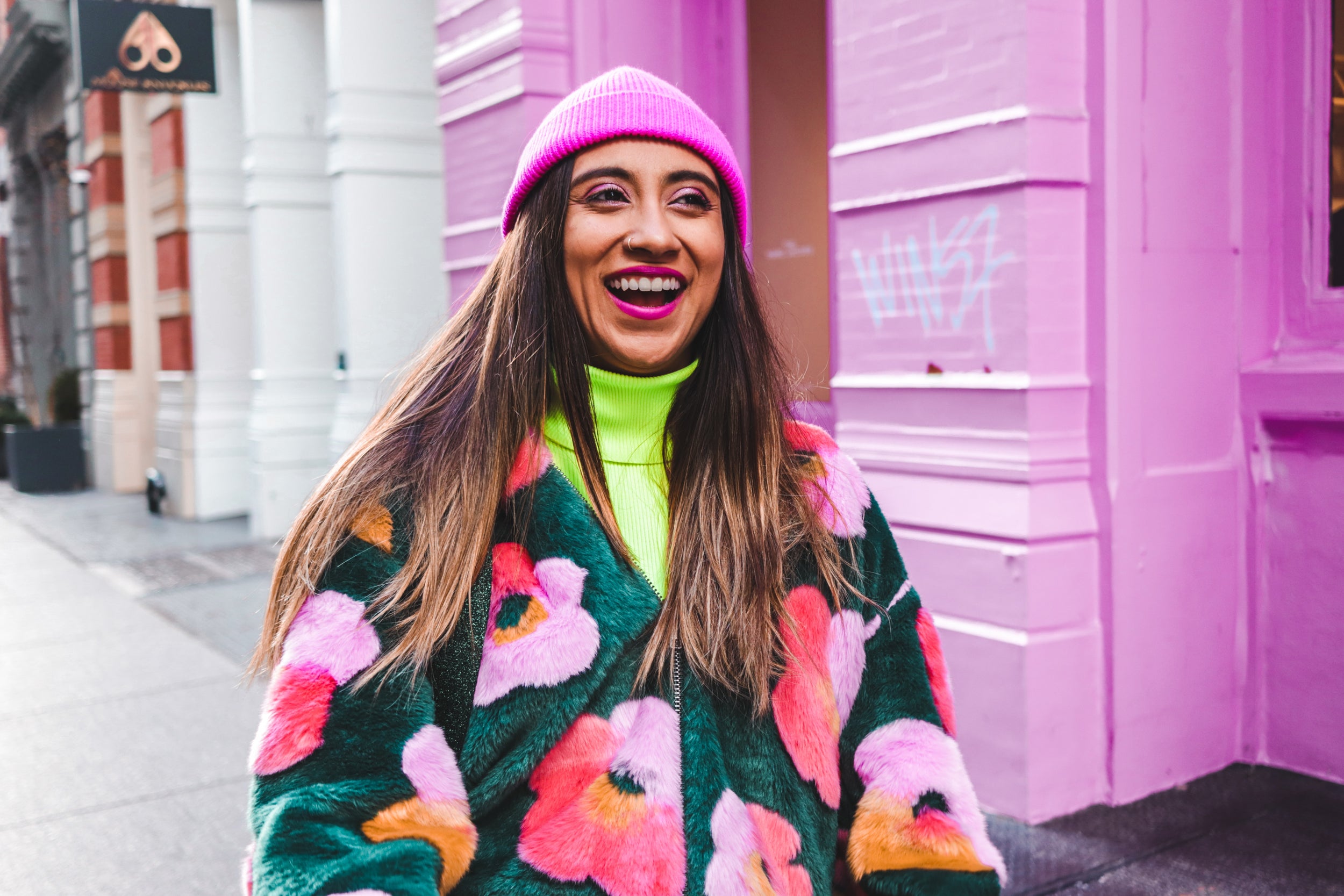
Now that we’ve established the benefits of lookbooks, we’ll explore how you can create one for your own brand. Even if you’re not a natural creative, a DIY digital lookbook can be created in six simple steps:
- Decide what you want to achieve with your lookbook
- 使strategic design choices that tell a story
- Invest in professional photography and video for a polished look
- Choose a lookbook-friendly theme or a plug-and-play template
- 使it shoppable by installing a lookbook app
- Drive sales from your lookbook
Let’s dive into each step to learn more and get inspired by some real lookbook designs from top brands.
1. Decide what you want to achieve with your lookbook
As with any brand exercise, answering the “why” is incredibly important before you start.What is the purpose of your lookbook?Are you looking to increase sales, tell a brand story, acquire retail partners, announce a seasonal collection, or launch a new series of products?
Establish your goals upfront, as this will help you determine format. For example, if your lookbook’s goal is to generate interest from retailers, it might work best as a digital magazine or flip book. Store owners wanting to use digital lookbooks as a selling tool might opt to use an app that links lifestyle photos to product pages.
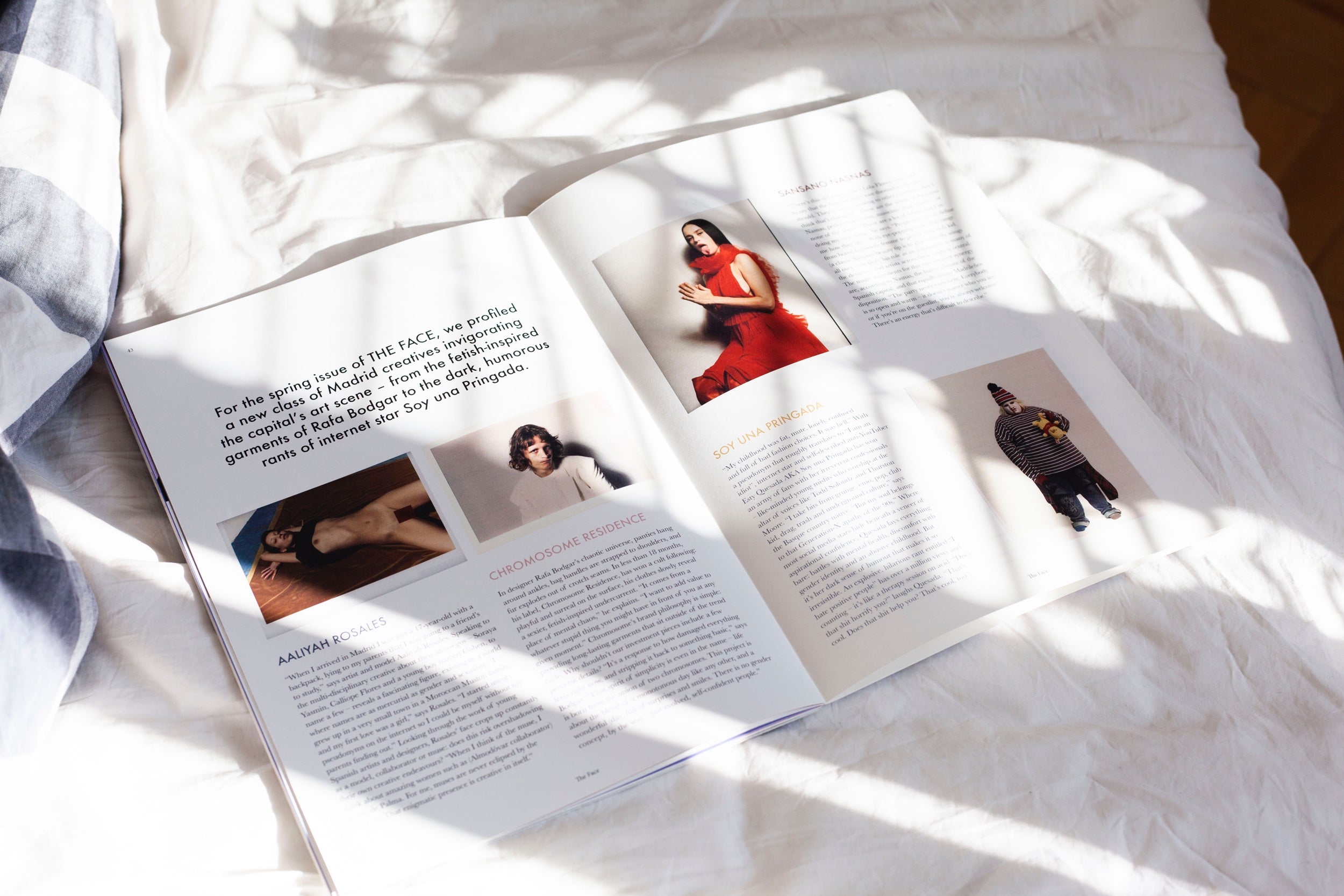
If your lookbook is a seasonal play, say kicking off a new fashion season or holiday-specific products, you may want to create a lookbook template that you can easily replicate over and over. Planning your lookbooks in advance will help you maximize time and output in photo shoots.
You’ll also need to choosea tool that will help you build your desired lookbook. Many Shopify themes and apps let you add a lookbook directly to website pages with preset templates. Or you can build one from scratch using a free third-party lookbook maker likeCanva,Issuu, orFlipsnack flip book maker, or a premium tool likeAdobe InDesign.
Live lookbook example:
Designer labelBotteruses its fashion lookbook to draw customers into the live fashion show experience with fullscreen photos that scroll through runway looks of its latest collections.

2. Make strategic design choices that tell a story
Once you’ve nailed the goal of your lookbook,it’s time to inject some personality. When you launched your brand, you likely did an exercise to discover what your brand stands for (brand values) and used that to inform voice, tone,brand story, andbranding design. This is where that work comes to life.
Consider every decision you make, from color palette to photography location to descriptions, and check in with yourself often: Do these choices reflect my brand? Is the story I’m trying to tell translating to my audience? What feeling do I want customers to have when they browse my lookbook?
When you tell the story, remember to center your customer as the main character.他们应该能够看到自己在看book through compelling and aspirational visual storytelling. You can also use text to tell your story, but lean away from product information in favor of editorial writing that supports the lifestyle photos.
Live lookbook examples:
Peppermint Cycling大图像th的相片管理里特性at show its activewear products in use, helping customers see how they perform under pressure. The brand also understands its outdoor-loving target customer and uses gorgeous natural scenery as a backdrop for the shoot.

Kids’ brandMonkindtells its story through compelling visuals: beachy looks are set against nautical seaside backdrops. But the images are also dotted through with a story from the kids’ perspective, drawing customers into the brand’s promise of ease and leisure.
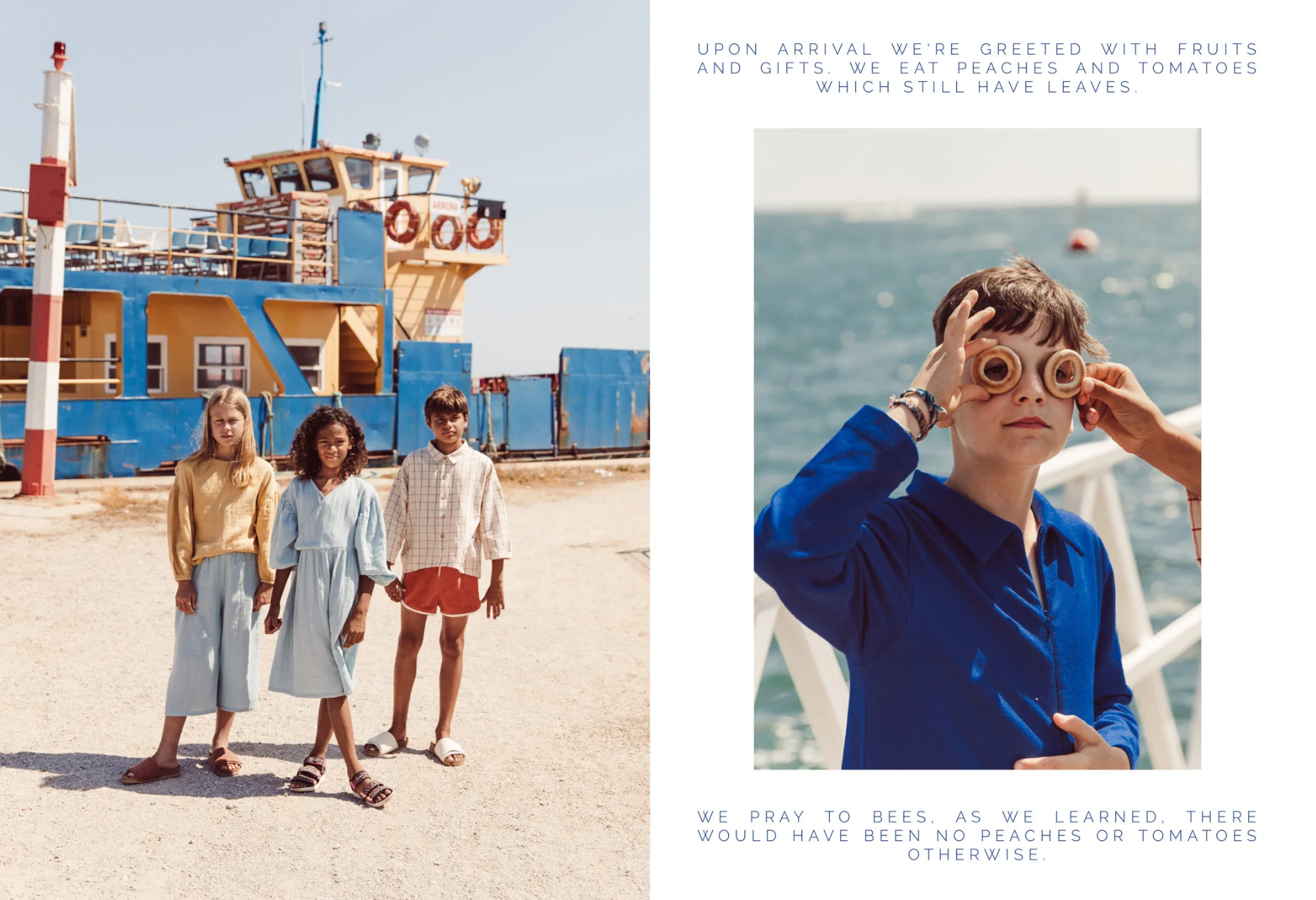
3. Invest in professional photography and video
As we’ve mentioned, hiring a photographer is the best way to help you achieve professional results. These pros are the experts on how choices like camera angle and lighting can convey a mood or message. If you’re launching your brand on a budget, this is where you might splurge. For online stores, photography has to do a lot of heavy lifting to replace the tactile experiences of a retail store. That’s why it can be make or break for new brands.

Hiring a video director and editor can be even more expensive, but videos pack more punch than a static photo. They are especially helpful for products like wedding dresses, where movement is a purchasing consideration, or for activewear—demonstrating yoga shorts that don’t roll or ride up when a model moves through poses is more powerful than telling a customer about these features.
Live lookbook example:
RIFRUFis a pet brand but it’s also a lifestyle brand. To stand out in a crowded market of pet supplies, RIFRUF goes hard on its brand POV. To attract its ideal customers—young, trendy pet owners—it uses video in its lookbook, capturing its vibe through action, music, and deliberate video effects.

4. Choose a lookbook-friendly theme
Picking awebsite templatethat is already lookbook-enabled is an easy way to create a digital lookbook for your brand—just plug your photos into existing templates. Many Shopify store themes feature this option—some are even free to install.

Here are our picks for the best themes from theShopify Theme Store:
- Dawn(free)
- Studio(free)
- Story($$)
- Cascade($$)
- Streamline($$$)
Live lookbook example:
King Iceuses lookbook-enabled Shopify themeDistrictto easily showcase each collection in a dynamic way, using graphics and other design elements to tell a story.
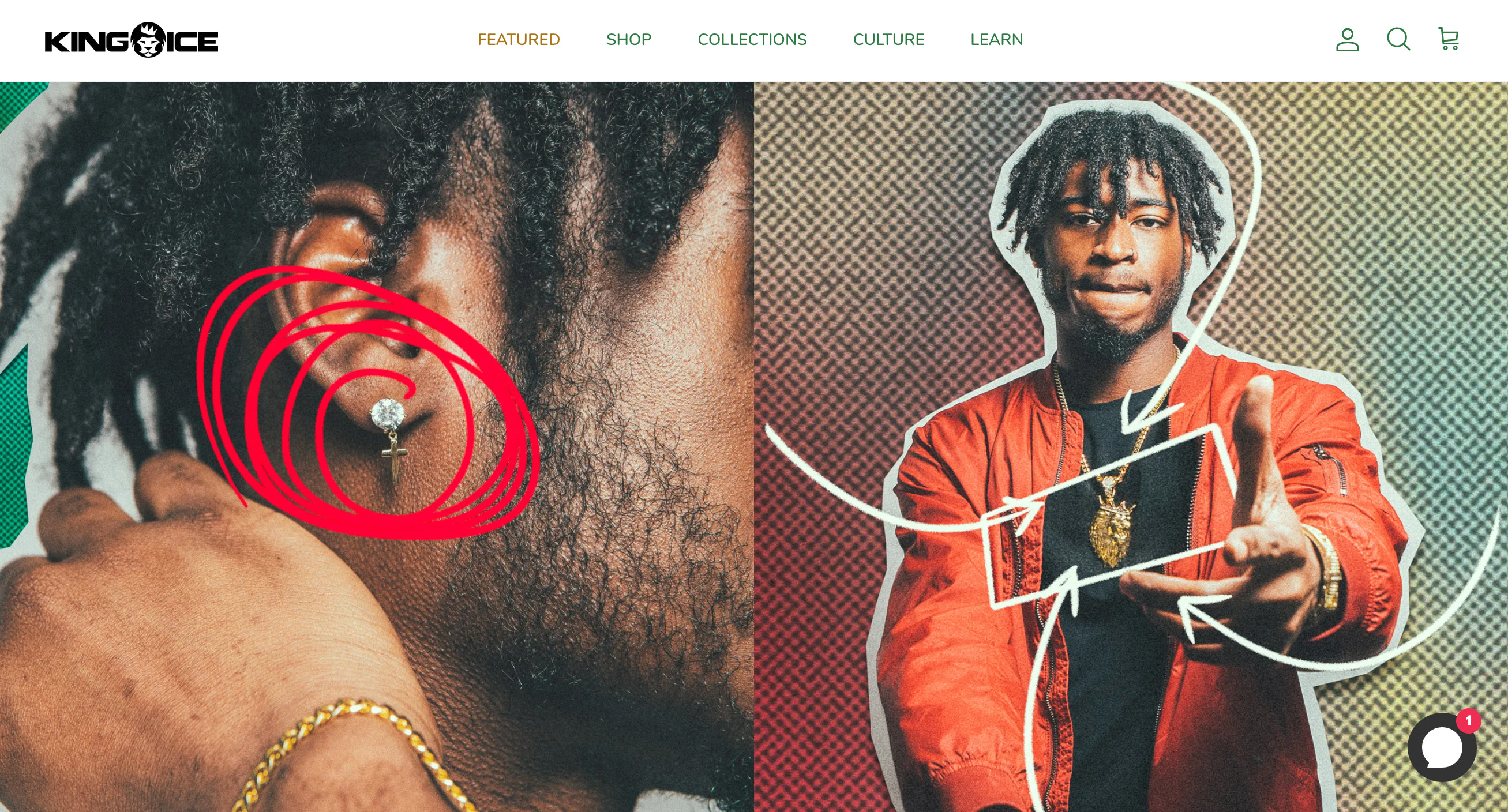
Shopify上推出自己的品牌,我们自由了
5. Make it shoppable by installing a lookbook app
A lookbook app can upgrade your flat lookbook with features like shoppable images, hover animations, virtual magazine/flip-book layouts, auto-created lookbooks from Instagram feeds, and embedded video. They negate the need to use an online lookbook creator tool. Apps enhance the functionality of your Shopify theme by layering on specific features that help you reach your lookbook’s goals.

Here are our picks for some of the best apps in theShopify App Store:
- Lookbook by Mod Media($$)
- Lookbook: Shoppable Galleries($ to $$)
- Image Gallery + Video by EA(free to $$)
- Vimeo Create: Video Maker(free)
- LookThru($)
- Covet.pics(free to $$$)
Live lookbook example:
By hovering over lookbook images onSteamline Luggage’s site, a pop-up shows the featured product in more detail, including prices and product name, and offers customers a direct link to buy.

6. Drive sales from your lookbook
The easiest way to drive sales from your lookbook is to enable it with shoppable features like pop-ups and direct links to product pages or one-click Add to Cart buttons. The more challenging part of this equation is getting eyes on your lookbooks in the first place.
There are several ways to achieve this, however:
- Use a tool likeLinkpopto give social media bio URLs more power. Rather than one link, your Linkpop microsite can link out directly to your shop—and your lookbook, too.
- Create anemail marketingcampaign or social push to tease your upcoming collection or announce its launch. Link all efforts to your shoppable lookbook page, rather than product pages.
- Sendpackaging inserts(say postcards) with customer purchases to announce the lookbook. Using a QR code means you can use the same printed assets over and over, updating the link for each new collection and lookbook.
- If you choose an automated lookbook using an app, you canpull lifestyle photos into various pages of your site, giving product pages a mini-lookbook effect, and making your lookbook easier for customers to discover.
Live lookbook example:
KOI Footwear’s lookbooks are linked from the brand’s top navigation bar, so they can be easily discovered by customers. Lookbook images then link directly to product pages where customers can shop the looks. Koi’s lookbooks win by capturing the brand’s unique and bold aesthetic—right down to choice of fonts and colors.
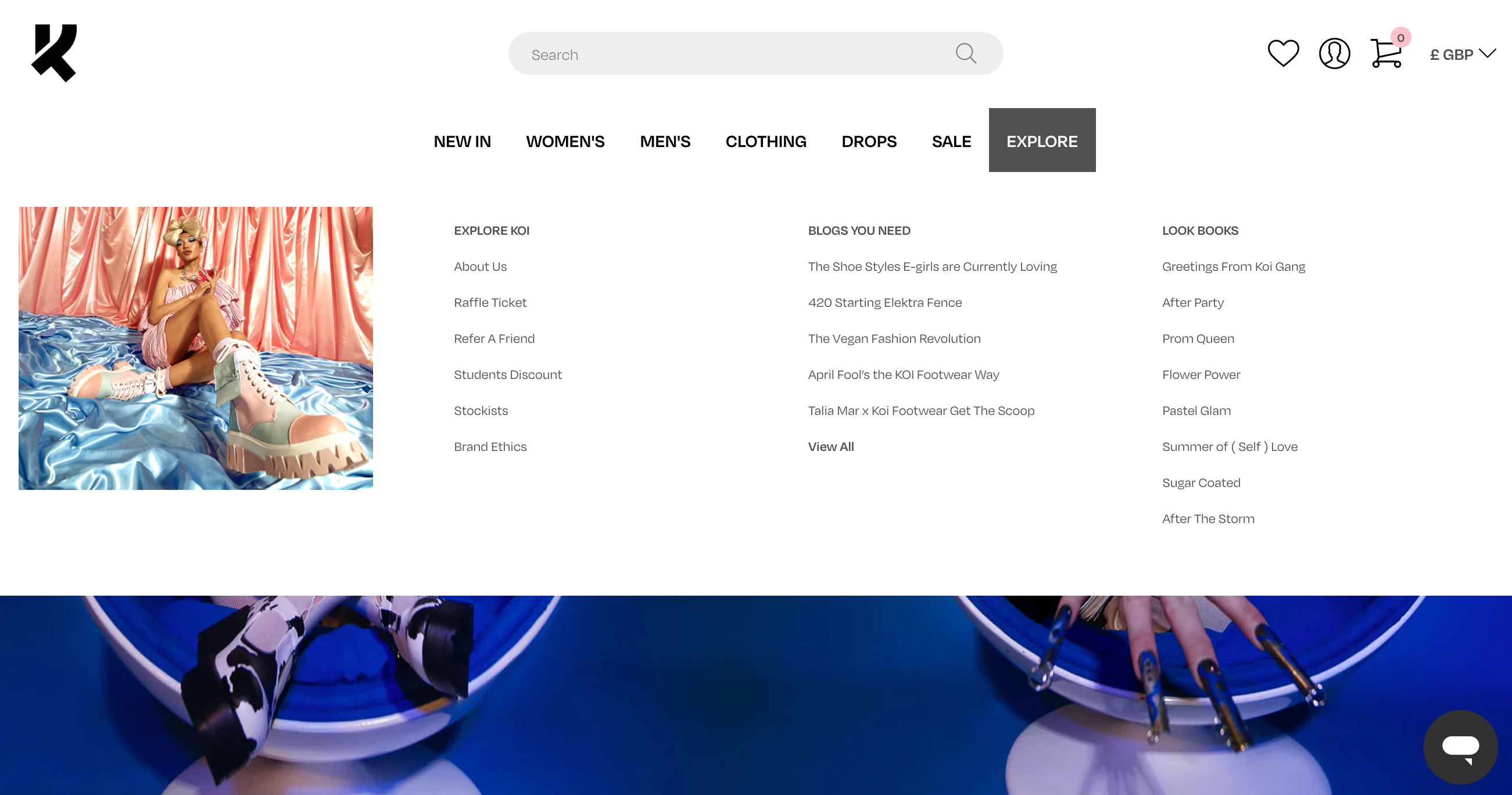
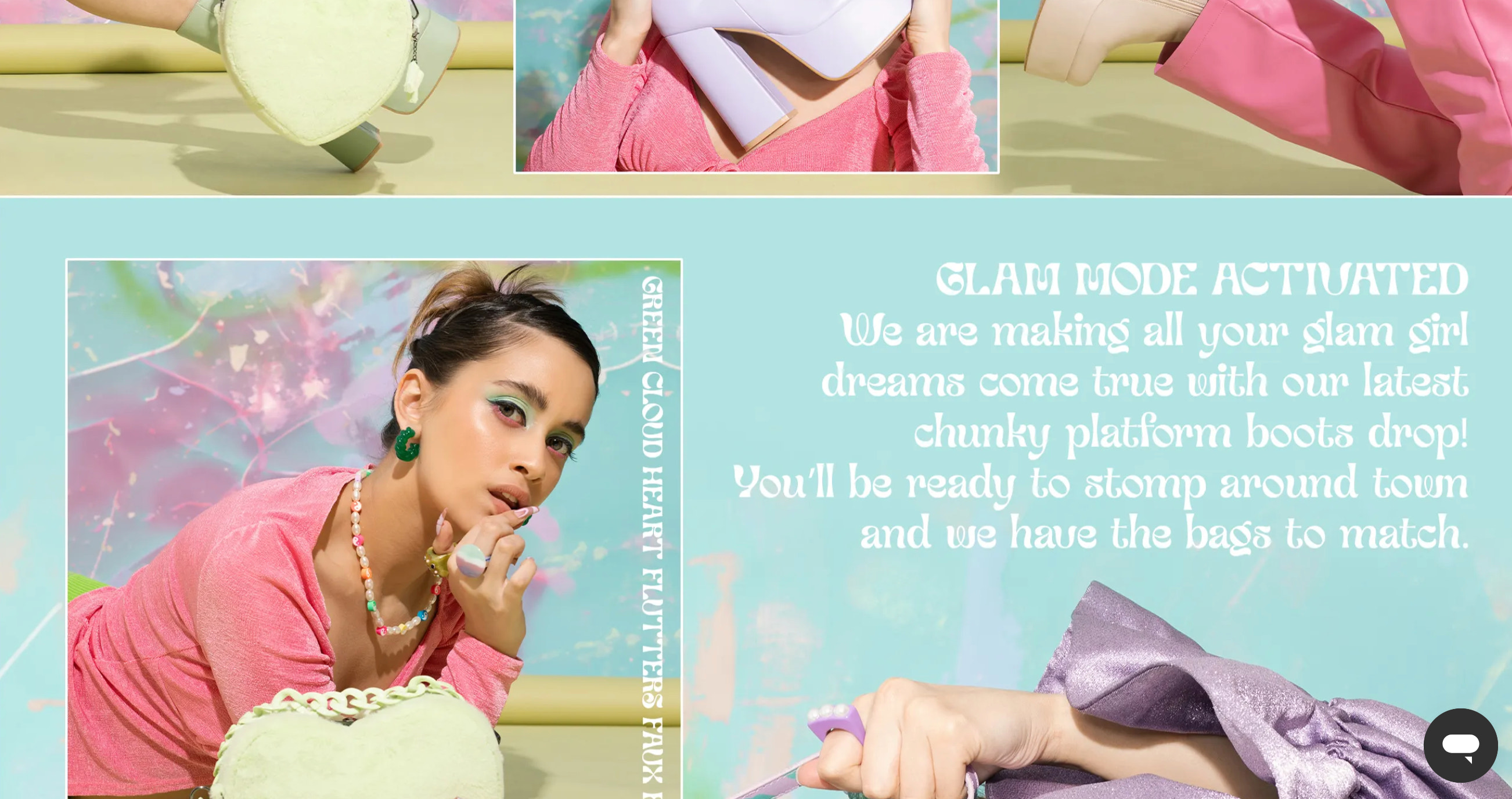
Use lookbooks to achieve your business goals
Fashion and lifestyle businesses can benefit greatly from digital lookbooks to inspire their customers, launch new collections, and drive sales. Using free tools and website integrations can help you build your vision—even with no budget or graphic design skills.
Digital lookbook FAQ
What is a digital lookbook?
A digital lookbook is an arrangement of photos and multimedia displayed in an online format like a PDF magazine or webpage. They are used as a portfolio for artists and designers, and often as a selling tool for consumer brands that sell lifestyle or fashion products. Digital lookbooks typically feature lifestyle photos—and sometimes videos or GIFs—in multiple layouts.
How is a digital lookbook different from a traditional lookbook?
A digital lookbook is a lookbook that lives online or in a digital format like a PDF or digital flip book. Traditional lookbooks, often used by fashion designers, models, and photographers to showcase collections and other work, are printed physical books. Generally, the two are similar in content and purpose and simply differ in format.
Are lookbooks a good fit for my business?
Any business with a strong focus on brand would benefit from a lookbook.Clothing businessesand anything with a lifestyle component—think wine,pets,cosmetics,home décor, or bicycles—are a great fit for lookbooks. Businesses like plumbing part manufacturers or online business course providers, on the other hand, may not be good candidates.
What are some tools for creating a digital lookbook?
You can build a lookbook from scratch using a free or low-cost third-party lookbook maker likeCanva,Issuu, orFlipsnackflip book maker, or a premium tool likeAdobe InDesign.
How can I create a digital lookbook on Shopify?
Many Shopify themes and apps let you add a lookbook directly to website pages with preset templates—simply plug in your lifestyle photos. Browse theShopify Theme Storefor lookbook-friendly templates, or install a lookbook app from theShopify App Storethat gives your lookbook additional functionality.

